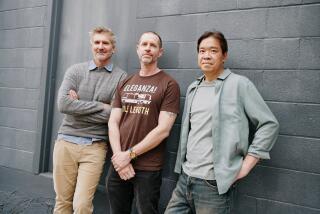Author’s Seminal Work Not Yet on U.S. Shelves
- Share via
No one was more thrilled on hearing that Gao Xingjian had won the Nobel Prize in literature than Dr. Mabel Lee, the Australian academic who translated his seminal novel, “Soul Mountain,” into English. “He is an artist, a very elegant writer,” she says.
Lee, who recently retired as a professor of Chinese literature and history at the University of Sydney, worked part time for five years on the novel. “Finding a publisher,” she says, “took two years.”
Lee’s agent, Lyn Tranter of Australian Literary Management, took the novel to HarperCollins Australia, which published it in 1999 under its Flamingo imprint. This is the only English-language edition of the book, which was first published in Taipei, Taiwan, in 1980, then in Sweden and France.
World rights have not been sold, according to Rod Morrison, Gao’s editor at HarperCollins Australia. “Soul Mountain,” while on a bestseller list in Australia, is not available in the United States but is being offered to publishers here and in Britain. However, “The Other Shore: Plays by Gao Xingjian,” published by Chinese University Press in 1999, is available in English through the Internet.
Gao’s plays have rarely been produced in the United States. The Yangtze Theatre Company gave 12 performances of “Between Life and Death” at an off-off-Broadway theater in 1997. “It was not living-room drama, that’s for sure. It had great mythic quality,” said Crystal Field, artistic director of Theater for the New City in New York. “It was a beautifully done piece.”
The Nobel honor is “long overdue,” said Haiping Yan, an assistant professor of theater and comparative literature at the University of Colorado who edited some of Gao’s plays for an anthology of contemporary Chinese literature.
She said Gao’s reputation as a dramatist was established in 1982 with a production by the state-run People’s Art Theater Company in Beijing of “Bus Stop,” a play that focuses on an anxious group of commuters waiting for a bus that never arrives, a work compared by Western critics to Samuel Beckett’s absurdist masterpiece “Waiting for Godot.” But, Yan said, the play’s perceived Western influence, together with its implicit criticisms of Chinese society, provoked a “national controversy,” and the production was closed down after only a few performances.
While Gao was influenced by European modernists such as Beckett and Eugene Ionesco, Yan added, he is “one of those authors whose artistic and humanistic social visions are deeply rooted in Chinese experience, but are also relevant to human experiences in general.”
Yan’s colleague, Howard Goldblatt, a professor of East Asian literature, spoke to the significance of a Chinese author winning a Nobel: “It’s become a national obsession to a certain degree. I think that any sort of international recognition in whatever field is important to them, to show their standing in the world community. And a country that large, with a long literary tradition, for them to have been frozen out so long is a bit of a slap in the face, I think.”
More to Read
The biggest entertainment stories
Get our big stories about Hollywood, film, television, music, arts, culture and more right in your inbox as soon as they publish.
You may occasionally receive promotional content from the Los Angeles Times.











